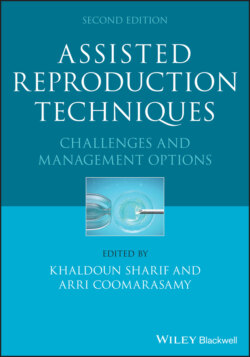Читать книгу Assisted Reproduction Techniques - Группа авторов - Страница 142
Key points
ОглавлениеChallenge: Hyperprolactinemia and ART treatment.
Background:
Hyperprolactinemia inhibits ovulation, causing infertility.
Treatment of hyperprolactinemia restores fertility.
Transient hyperprolactinemia during ART is not clinically significant.
Causes of hyperprolactinemia:Physiologic: pregnancy and lactation, macroprolactin, stress, excessive exercise, nipple stimulation.Pharmacologic: antipsychotics (phenothiazines, thioxanthenes, atypical antipsychotics); antidepressants (tricyclic antidepressants, monoamine oxidase [MAO] inhibitors, selective serotonin reuptake inhibitors [SSRIs]); gastrointestinal medications (metoclopramide, domperidone, cimetidine); antihypertensives (α‐methyldopa, reserpine, verapamil); estrogens; opioids.Pathologic (i) pituitary tumors; (ii) renal failure; (iii) primary hypothyroidism; (iv) polycystic ovary syndrome; (v) liver cirrhosis; (vi) chest wall lesions and trauma; (vii) idiopathic hyperprolactinemia.
Management of hyperprolactinemia:
Treat the underlying cause.
If safe, withdraw offending medication.
Dopamine agonists for pituitary tumors.
Surgery and/or radiotherapy if dopamine agonist resistance/intolerance.
It is safe to continue with bromocriptine or cabergoline during an ART cycle and until a positive pregnancy test.
Pregnancy and breastfeeding:
Monitor for pituitary tumor growth during pregnancy.
Withhold dopamine agonists in women wishing to breastfeed.
